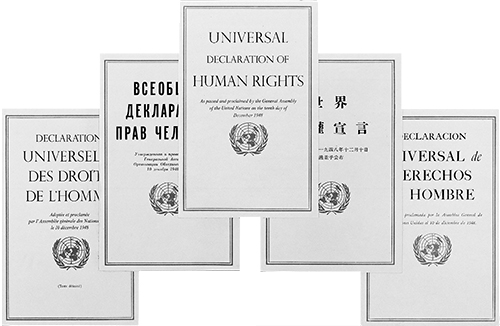What Are Human Rights?
Human rights are rights inherent to all human beings, regardless of race, sex, nationality, ethnicity, language, religion, or any other status. Human rights include the right to life and liberty, freedom from slavery and torture, freedom of opinion and expression, the right to work and education, and many more. Everyone is entitled to these rights, without discrimination.
Universal Declaration of Human Rights
The Universal Declaration of Human
Rights (UDHR)is a milestone
document in the history of human rights.
Drafted by
representatives with different legal and cultural backgrounds from all regions
of the world, the Declaration was proclaimed by the United Nations General
Assembly in Paris on 10 December 1948 by General Assembly resolution
217 A (III) as a common standard of achievements for all peoples and all
nations. It sets out, for the first time, fundamental human rights to be
universally protected. Since its adoption in 1948, the UDHR has been
translated into more than 501 languages – the most translated document in the world -
and has inspired the constitutions of many newly independent States and many
new democracies. The UDHR, together with the International Covenant on Civil and Political
Rights and its
two Optional Protocols (on the complaints procedure and on
the death penalty) and the International Covenant on Economic, Social
and Cultural Rights and its Optional Protocol, form the
so-called International Bill of Human Rights.
And here you can read the first 10 articles:
Article 1.
Article 2.
Article 3.
Article 4.
Article 5.
Article 6.
Article 7.
Article 8.
Article 9.
Article 10.
Article 1.
All human beings are born free and equal in dignity and rights. They are endowed with reason and conscience and should act towards one another in a spirit of brotherhood.
Article 2.
Everyone is entitled to all the rights and freedoms set forth in this Declaration, without distinction of any kind, such as race, colour, sex, language, religion, political or other opinion, national or social origin, property, birth or other status. Furthermore, no distinction shall be made on the basis of the political, jurisdictional or international status of the country or territory to which a person belongs, whether it be independent, trust, non-self-governing or under any other limitation of sovereignty.
Article 3.
Everyone has the right to life, liberty and security of person.
Article 4.
No one shall be held in slavery or servitude; slavery and the slave trade shall be prohibited in all their forms.
Article 5.
No one shall be subjected to torture or to cruel, inhuman or degrading treatment or punishment.
Article 6.
Everyone has the right to recognition everywhere as a person before the law.
Article 7.
All are equal before the law and are entitled without any discrimination to equal protection of the law. All are entitled to equal protection against any discrimination in violation of this Declaration and against any incitement to such discrimination.
Article 8.
Everyone has the right to an effective remedy by the competent national tribunals for acts violating the fundamental rights granted him by the constitution or by law.
Article 9.
No one shall be subjected to arbitrary arrest, detention or exile.
Article 10.
Everyone is entitled in full equality to a fair and public hearing by an independent and impartial tribunal, in the determination of his rights and obligations and of any criminal charge against him.


No hay comentarios:
Publicar un comentario